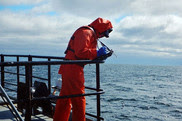
Eat Seafood, America—Good for You, Good for the Planet!
Want to help support seafood farmers AND the environment? Then eat some oysters! This Emmy-winning video explains how restoration specialists use oyster shells collected from restaurants and the public to rebuild wild oyster reefs. Try a mouthwatering oyster recipe from FishWatch, then learn more about oyster restoration and shell recycling programs near you! |
|
Highlights

NOAA Fisheries and Sea Grant have announced the 2020 Fisheries–Sea Grant Joint Fellowship recipients. The talented class includes nine population and ecosystem dynamics fellows and one marine resource economics fellow. The program supports students pursuing doctoral degrees in population and ecosystem dynamics, as well as marine resource economics.
|
|
|
Alaska

Sea surface temperatures in the Central Gulf of Alaska remain warmer than average and continue to oscillate around the 90th percentile mark. There were two periods with heatwave conditions in the past 90 days, June 8–23 and July 14–August 3rd.
|
|
|
West Coast

With news of multiple pregnancies among the endangered Southern Resident killer whales, agencies and partners are calling for boaters to steer clear of the whales. The Washington Department of Fish and Wildlife, NOAA Fisheries, whale watch leaders, and Soundwatch are asking boaters to give the whales extra space on the water at this critical time.
|

States and tribes can remove California and Steller sea lions from a management zone on the Columbia River and its tributaries where they prey on at-risk salmon, steelhead, lamprey, sturgeon, and eulachon, under a new authorization by NOAA Fisheries’ West Coast Region.
|

NOAA Fisheries this week made effective new regulations to implement measures that will promote the safety of fisheries observers on tuna-fishing vessels. These measures reflect stronger international standards developed through years of U.S.-led negotiations to improve the safety of observers at sea.
|
|
|
Southeast

NOAA announced a new partnership with the Gulf States Marine Fisheries Commission to restore recreational fish species impacted by the 2010 Deepwater Horizon oil spill. This award will focus on the development of best practices for fish descender devices by distributing them to recreational anglers and providing information on their use. Surveys on attitude changes, use, and effectiveness of the devices will be conducted to track project success.
|
|
|
Greater Atlantic

NOAA Fisheries Atlantic salmon researchers have found that abundance can increase as more young fish and returning adults survive their encounters with dams. Also, progress in rebuilding the population will depend heavily on continuing stocking of hatchery fish raised especially for this purpose.
|

Andrew Jones joined the Northeast Fisheries Science Center’s Cooperative Research Branch as fishery biologist in March. He now leads the branch's research projects that depend on working directly with the fishing industry.
|
|
|
| |
|

No comments:
Post a Comment